CIA Sponsored Terror, Civil Liberties, Guantanamo, Habeas Corpus, Human Rights, Prosecution of the Bush Administration, Supreme Court, Surveillance, Targeting Muslims, Torture, Truth to Power
Podcast: Play in new window | Download
Host Updates:

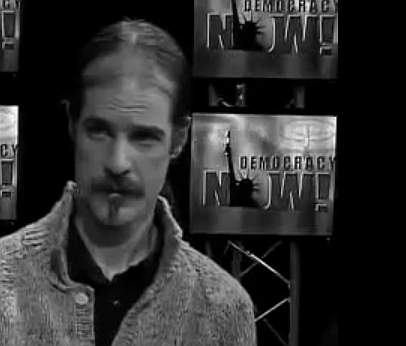
Elliot Madison: Activist Arrested for Using Twitter To Communicate With G20 Protesters.
Elliot Madison, a social worker and activist was arrested in Pittsburgh last month during the G20 Summit and was charged with hindering apprehension or prosecution, criminal use of a communication facility and possession of instruments of crime. The Pennsylvania State Police say he was found in a hotel room with police scanners and computers while using the social networking site Twitter to communicate police movements to protesters. Madison recently said “They arrested me for doing the same thing everybody else was doing, which was perfectly legal,” he said. “It was crucial for people to have the information we were sending.” Madison’s laywer Martin Stolar told the New York Times “He and a friend were part of a communications network among people protesting the G-20,” Mr. Madison’s lawyer, Martin Stolar, said. “There’s absolutely nothing that he’s done that should subject him to any criminal liability.”
Attorney Martin Stolar:
- It seems it would be helping out the police in a way. They’re saying disperse, don’t go here, don’t go there.
- They selected him for some reason amid all the various people posting things on twitter boards
- They got a search warrant for his hotel room, rousted he and a colleague who was there, arrested Elliot and he was held on a 30 thousand dollar bail.
- Unfortunately, agents of the FBI, and the Joint Terrorism Task Force, showed up at his home in Queens, with a search warrant issued by a Federal Court in Brooklyn, seeking evidence of violating the federal anti-rioting laws. (H.Rap Brown Act) Think about the Chicago 8.
- They spent 16 hours searching his home, grabbing everything in sight, it was terribly unclear what would violate this law. So they took pictures of Lenin, his writings, computers, material from producing a documentary film.
- The warrants seemed properly issued, until I can see the affidavits that underlie the warrant.
- I whipped up some legal papers to show cause and a motion under Federal rules of criminal procedure 41G. A motion for the return of property illegally seized.
- He is accused of posting stuff that is publicly available, that is a police scanner that is posted on the internet, such as a police order to disperse.
- That information is passed on through the Twitter board and that constitutes the crime that he is charged with.
- Law enforcement is targeting those who provide support for lawful demonstrations.
- This case is a first in Pennsylvania and a real stretch in criminal law to penalize what is essentially speech
- In New York, there is potentially a separate investigation in which Elliot is a target
- The so-called Green Revolution in Iran, the demonstrators were using Twitter, in exactly the same way the folks in the G20 used it. When the oppressive government came down on the Iranian students using Twitter, the US State Dept said, wait a minute there are free speech issues here.
Guest – Attorney Martin Stolar, president of the New York chapter of the National Lawyers Guild.
———
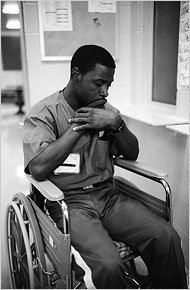

Supreme Court To Argue Life Without Parole Cases For Children
The Supreme Court will address whether it’s constitutional to sentence a child to be imprisoned for life without parole for an offense committed during adolescence. There will be two main cases the Supreme Court will argue. One is the case involving Joe Sullivan. Joe, at the time, was a mentally disabled 13 year old child living in a home where he was physically and sexually abused. He was convinced to participate in a burglary of a home. The elderly home owner was sexually abused, though she didn’t see her attacker. Joe was tried in an adult court, found guilty and sentenced to life in prison without the possibility of parole. He was fourteen when he was sent to an adult prison, there he was abused and later diagnosed with MS. That is a summary of one of the cases.
Professor Stephen Harper:
- 2400 Kids in jail serving life sentences without parole in the US. 120 of those kids didn’t commit homicides.
- The United States is the only country in the world that sentences children to life, without the possibility of parole
- Part of this sentencing of kids was an accident, they were getting tougher on adults in the early 80s and 90s.
- There should be an opportunity, Sullivan’s lawyer argued that at some point they could be granted parole
- Florida is the number one state that puts children in prison for life without the possibility of parole
Guest – Stephen Harper, Adjunct professor of Juvenile Justice University of Miami school of Law.
———————–
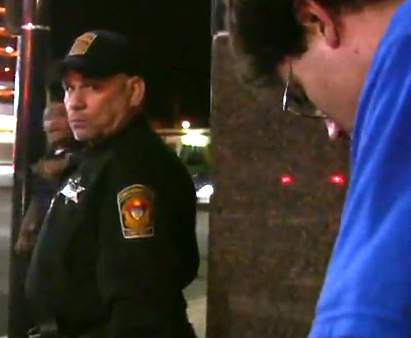
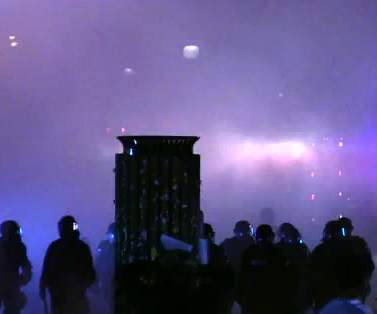
National Lawyers Guild Observes Improper Use of Force by Law Enforcement at the G-20
Many listeners have probably seen the videos of the G20 protesters going up against hundreds of riot police. Some of the most compelling footage were of reckless use of LRAD, the sonic weapons, and the surge of riot police onto the University of Pittsburgh campus. Many students who were not protesting were rounded up, knocked down, tear gassed and beaten by police. We reported last month on the blatant violations of first amendment rights as local police engaged in patterns of harassment on activists such as the group Seeds for Peace. Today we hear first hand accounts of police abuse from our own Heidi Boghosian who was at the marches and demonstrations as a legal observer and we’ll be joined by attorney Joel Kupferman, who was also at the also a legal observer with National Lawyers Guild at the G20 Summit. Read Heidi’s G20 Blog Entry Here
Heidi Boghosian / Joel Kupferman
- LRAD Sonic Weapons combined with order to disperse. You had to cover your ears, some stayed still, paralyzed. We think it’s illegal, it’s and invasion, it’s a weapon.
- One of the legal angles, we’re looking into is the fifth amendment, where we charged Christine Todd Whitman after 9/11 for violating our fifth amendment rights of bodily integrity and in this case, that sound pierced that bodily integrity.
- The manufacturer of the device (LRAD) filed in their SEC filings of Sept 2008 that the device is capable of sufficient acoustic output to cause damage to human hearing or human health, expressing concern that the misuse could lead to lawsuits.
- Private security police forces were employed. They went up the hill, onto the campus and students were just coming out of their dorms, hearing this noise, the helicopters, they didn’t know whether they should stay in their buildings. They started to arrest people who didn’t know what was going on.
- This is the highest police per protester ratio I’ve ever seen, definitely a radicalizing experience for these students, definitely no cause for arrests. Wantonly arresting people in a violent fashion.
- When we spoke to shop owners downtown, there was a hatred, I’ve never seen before. The sympathy came from the neighborhoods of color, it was a climate of fear, they were basically saying, you can’t assemble.
- It almost seemed like it was a police convention. The Pittsburgh Police Department wore military fatigues. I saw more Canine Units there then any other demonstration.
Guest – Attorney Joel Kupferman, National Lawyers Guild Legal Observer /New York Environmental Law and Justice Project
————————————————
Civil Liberties, Criminalizing Dissent, FBI Intrusion, Guantanamo, Habeas Corpus, Human Rights, Prosecution of the Bush Administration, Supreme Court, Surveillance, Targeting Muslims, Torture, Truth to Power
Podcast: Play in new window | Download
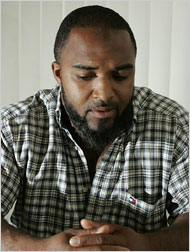
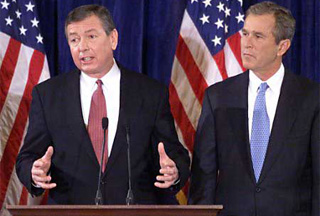
Lawsuit Brought Against Former US Attorney General John Ashcroft
Last month, a major decision written by a federal judge gives a lawsuit standing that was brought against former US Attorney General John Ashcroft for the illegal and unconstitutional detention of American Muslims. The lawsuit was brought by Abdullah al-Kidd, an American citizen and African American who had coverted to Islam. In 2003 Al-Kidd was arrested, and detained under abusive conditions without evidence that he did anything wrong. The lawsuit points at the way John Ashcroft abused the material witness statute to “preventively detain” American Muslims. Ashcroft uses the statute as a pretext to arrest American Muslims without sufficient evidence to establish probable cause. This suit will be a key lawsuit when President Obama presents a proposal for a “preventive detention system.”
Lee Gelernt:
- Federal Appeals court recognized the abuse of the material witness statute under Ashcroft.
- Material witness statute, rarely used, limited purpose before 9/11. If the witness would not testify and needed testimony, they would arrest witness get testimony then release person.
- If its taking too long, get the person’s deposition, because you simply cannot hold a witness for a long time, because they’re completely innocent.
- After 9/11 the government used the material witness statute on Muslim men who were suspicious and no probable cause. Probable cause is the bedrock of this country. Mere suspicion is not enough.
- It turned out that dozens and dozens of men were arrested as mere witnesses, held for months under the most harsh conditions. They have to be unwilling to be a witness, you don’t simply arrest a witness, obstensibly.
- Abdullah al-Kidd, born in Kansas, spent some time in Los Angeles, and mostly in Seattle. African American born in the United States. His father is a supervisor at the Chino Correctional Institute in California. His mother has done work for IBM for the last thirty years.
- He was a football player, went to University of Idaho on a football scholarship. Right before 9/11 he converted to Islam, and started working for charitable organizations. After 9/11 he was under surveillance, then arrested, held for 16 days under the very abusive conditions. Restricted for 14 months.
- FBI agents went to magistrate saying Al-Kidd had a one-way ticket to Saudi Arabia, it turns out after spending time in detention, that it was a round-trip coach ticket.
- The agents also did not tell the magistrate that he cooperated with the FBI and a native born citizen.
- Lawsuit is against Attorney General in a personal capacity and two FBI agents who submitted an affadavit, the United States and 3 Wardens. Settled lawsuit against the 3 wardens.
- FBI Director Mueller, went before Congress to report on the recent successes of the terrorism fight. The first person Mueller mentions is Kalik Sheikh Mohammed, the second person is Abdullah al-Kidd.
- Bedrock principle: You’re innocent unless the government has probable cause (objective reasonable belief) not law enforcement acting under suspicion. In other countries, people can be arrested on suspicion.
Guest – ACLU Attorney Lee Gelernt, the Deputy Director of the Immigrants’ Rights Project. He has litigated many cases including the Detroit Free Press v. Ashcroft and North Jersey Media Group v. Ashcroft, which involved challenges to the government’s post-September 11 policy of holding secret deportation hearings.
———
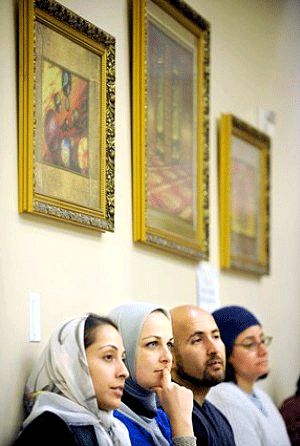

FOIA Lawsuit to Make Public the FBI’s Domestic Investigative Operational Guidelines
Last month, a Muslim civil rights group filed a lawsuit against the FBI’s refusal to make public its surveillance guidelines of civic and religious organizations in connection with criminal investigations. The group Muslim Advocates, a national legal and educational organization filed a Freedom of Information Act suit against the Department of Justice. The lawsuit is seeking the text of the Domestic Investigative Operational Guidelines. The quote DIOGs which went into effect last December are practical manual interpreting revised surveillance guidelines. The interesting part of this story is that civil rights groups including Muslim Advocates were shown drafts of the FBI surveillance guidelines but were not given a copy.
Farhana Khera:
- Agent are provocateurs sent into mosques. Muslim Americans should not have to look over their shoulders while they’re praying.
- Suspicion based on not wrongdoing and criminality, but religion. What concerns us is the set of guidelines issued during the waning days of the Bush Administration, that further and potentially expand FBI powers.
- We were able to see those guidelines in a meeting with the FBI, but not keep a copy of the guidelines. Those guidelines went into effect 1-2 weeks after that meeting.
- We sought formal channels to get a copy of those guidelines then filed a FOIA request.
- It’s been almost a year later, and we still have not got a copy of the guidelines.
- We would hope that the FBI would be working in consistence with the President’s committment to greater transparency
- The FBI said our request is under review and may be redacting or blacking out sections of the guidelines.
- We think the public has a right to know how the powers of the FBI have been expanded and are wielded in our name. What we saw in the draft guidelines were “gathering data about racial and ethnic communities” Geo-mapping of communities.
- Changes made to FBI guidelines under former Attorney General Ashcroft allow line agent FBI to make decisions based on limited evidence of criminality. One example, a prominent Pakistani physician made pro-democracy comments for Pakistan in a US newspaper. Days later he was visited by the FBI who wanted to ask him general political questions about Pakistan and Pakistani leaders.
- Check out Muslim Advocates “Got Rights?” Video.
Guest – Farhana Khera, first Executive Director of Muslim Advocates and the National Association of Muslim Lawyers (NAML). Prior to joining Muslim Advocates and NAML in 2005, Ms. Khera was Counsel to the U.S. Senate Judiciary Committee, Subcommittee on the Constitution, Civil Rights, and Property Rights. In the Senate, she worked for six years directly for Senator Russell D. Feingold (D_WI), the Chairman of the Constitution Subcommittee. Ms. Khera focused substantially on the USA PATRIOT Act, racial and religious profiling, and other civil liberties issues raised by the government’s anti_terrorism policies since September 11, 2001. She was the Senator’s lead staff member in developing anti_racial profiling legislation and organizing subcommittee hearings on racial profiling.
Afghanistan War, CIA Sponsored Terror, Civil Liberties, Guantanamo, Habeas Corpus, Human Rights, Iraq War, Military Tribunal, Prosecution of the Bush Administration, Targeting Muslims, Torture, Truth to Power
Podcast: Play in new window | Download
Updates:
- States increase opposition to money making traffic cameras: lawsuits.
——–

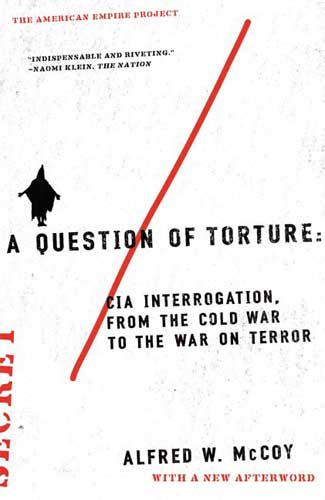

Alfred McCoy: CIA OIG Report PDF
Last month, marked the release of the CIA’s Office of Inspector General report investigating the use of “enhanced interrogation techniques” against detainees. The nearly fifty percent redacted report focused on incidents which exceeded the torture guidelines written in the Office of Legal Counsel torture memos. In the report, waterboarding a detainee 183 times was noted with only a concern, and highlighted abuses include faking the execution of a detainee by (quote) “contractors” without training and pointing an unloaded gun to a prisoners head. This report was not released with John Yoo’s torture memos. A move which could’ve helped prosecute torture architects such as Yoo and other Office of Legal Counsel lawyers who violated their professional ethical duties when they wrote memos claiming the administration’s proposed torture techniques were legal. Hear Al McCoy speak at Left Forum
Al McCoy:
- The chronology is important, the report is an investigation into excesses.
- The report also looks at the period ranging from 12 to 18 months when the alternative methods were authorized by President Bush – “enhanced interrogation techniques”
- For the first time in the history of the CIA, they were authorized to operate their own prisons, the so-called 8 black sites that operated from Thailand to Lithuania
- (Inspector General investigators) They opened up these secret sites and started collecting these detainees before they had clear guidelines and supervision
- Torture is seductive, erotic to the human mind, a process of which we know very little.
- Under US law section 23.40 of the Federal Code, psychological torture is legalized, there are only 4 things you can’t do under US law. One of them is death threats and death threats against a third party
- One of those hapless field agents that went over the top will take the fall. Yet, we know former Defense secretary authorized extraordinary techniques and his directions went down through the chain of command, it got all the way down to Abu Ghraib (prison photos link), where those soldiers were actually complying with those directives.
- The directives were illegal. You should be prosecuting the person who gave those orders at the top of the chain of command.
- In this case instead of having bad apples in military parlance, we’re going to have “rogue agents.”
- The stages of a country ruling with impunity – we’re not talking about a change of regime and then a tribunal, this is assuming continuity of government. (Clinton/Bush/Obama)
- It was necessary for our security: Dick Cheney’s latest argument – “so what, it made us safe.”
- We may have done these crimes but we now need to pull together and develop ourselves as a nation.
- The CIA had two distinguished cognitive scientists at Cornell University medical center in New York City, Doctors Henkel and Wolf. Ultimately they found the most devasting mode of torture is forced standing.
- Stand for hours motionless, sometimes days at a time, fluids flow to the legs, kidneys shut down, hallucinations begin, it’s incredibly painful.
- What they found back in the 1950s is you can make people do forced confessions, but its not very good in extracting objective information.
- Colin Powell’s former military aid, charged that Cheney in particular ordered this torture and extracted the false information – specifically with Ibn al-Shaykh al–Libi a prisoner whose false confession was used to link Saddam Hussein and Al-Queda.
- The best we can hope for is a Congressional Review, perhaps a Senate inquiry into the Bush years, that would look at the origin of the policy, the full nature of the policy, and whether or not it worked, not only gains but the costs. A serious, sober politically objective honest inquiry, apart from the prosecutions that may come from the Special prosecutor. Check out Progress Report’s – Accountability
- Within the American Psychological Association, these are not medical practicioners, they don’t take the Hippocratic Oath. It’s one branch of the medical community, the psychologists.
Guest – Professor of history at the University of Wisconsin-Madison. Author of “A Question of Torture: CIA Interrogation, From the Cold War to the War on Terror” and also “The Politics of Heroin: CIA Complicity in the Global Drug Trade.
———————————–

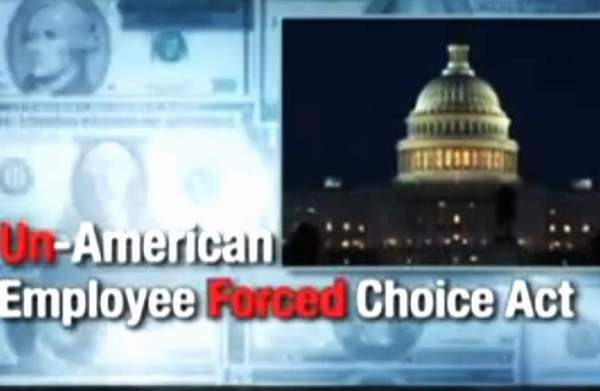
Labor Law Reform: Employee Free Choice Act
The Employee Free Choice Act is a proposed legislative bill that would speed up the process for employees to form a union. Under current labor law, workers can select union representation either through an election or something called card check, – a majority sign up. The US National Labor Relations Board will only certify a union as the exclusive representative of employees only if it is selected by a secret ballot NLRB election or if the employer agrees to a card check process. The catch is, that companies can refuse to bargain with a union chosen by a card check process even if 100 percent of employees want the union. Right now, the choice to use an election process or majority sign up is controlled by the companies.
The Employee Free Choice Act would change this process and take away employers’ ability to decide whether to use only the card check process or secret ballot election. This would make it much quicker process for employees who needed to form a union. This labor reform law has not been proposed without a fight, nearly 200 million is funding a misinformation campaign back by groups such as the Chamber of Commerce. Read Abby’s Public Eye article here.
Abby Scher:
- In the fifties, unions represented a third of the labor force, now they represent 12 percent.
- Employers have a lot of time to beat back the union. The Center for Responsive Politics found that the Chamber of Commerce spent 400 thousand dollars a day in opposition.
- The chamber of commerce is the largest lobby group in the country
- You can hear the rhetoric in their misinformation campaign. ..“EFCA is unAmerican, it takes away the secret ballot, unionists are thugs that will coerce workers into giving up their individual rights.”
- It’s harsh rhetoric from what you would consider a main stream group
- The national right to work committee since the fifties has flipped the script.
- Two phone calls have gotten attention, Bank of America and Citigroup . . .the center for Union Facts, – Rick Berman and Bernie Marcus talking about how EFCA would destroy capitalism and tried to motivate people on the call to give to Republican candidates
- Chamber of Commerce front group – Alliance to Save Main Street Jobs. In the misinformation campaign, the chamber of commerce is saying that EFCA will hurt small businesses, because everyone loves small businesses.
- They retained this woman to do a study about how EFCA would destroy 600 thousand jobs. This woman’s specialty is intellectual property, this is not her background, she is a gun for hire.
- It (her research) was easily debunked but you still hear people citing that study.
- Surprisingly, unions are growing. Big businesses are the threat against small businesses, not unions.
- I encourage everyone to subscribe to the AFL-CIO blog
- Unions help workers bargain for better wages, people have money to spend, buying power, quality of life.
Guest – Abby Scher, Editorial Director of the Public Eye. Check out Abby Scher on Making Contact’s Radio Feature
———————————————————-
Afghanistan War, CIA Sponsored Terror, Civil Liberties, Guantanamo, Habeas Corpus, Human Rights, Prosecution of the Bush Administration, Supreme Court, Surveillance, Targeting Muslims
Podcast: Play in new window | Download
Host Updates:
Segments This Week:
——-
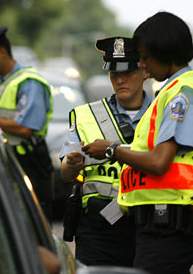
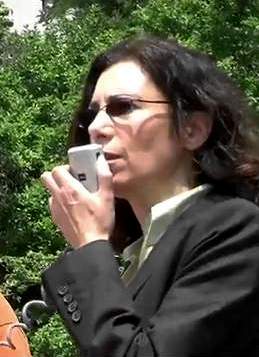
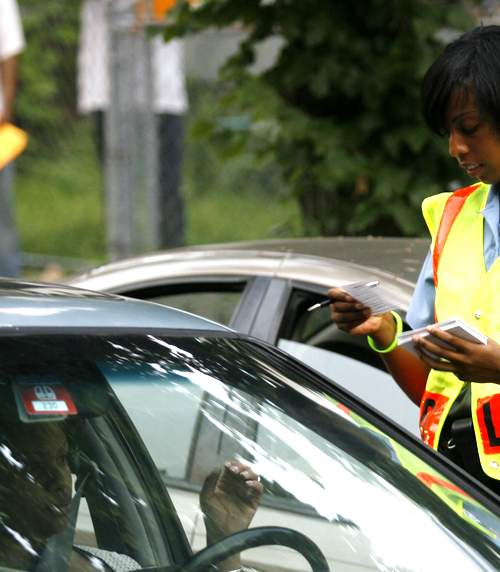
Washington DC Check Points Not Legal: Mara Verheyden-Hilliard
Last summer, D.C. police set up checkpoints around the city’s Trinidad neighborhood and denied access to drivers who refused to disclose their destination. The purpose of the checkpoints, according to the Metropolitan Police Department, was to deter violence after a string of drive-by shootings in 2008. Recently, a federal appeals court ruled that these checkpoints are unconstitutional. In the opinion, Chief Judge David Sentelle of the D.C. Circuit Court of Appeals wrote that “citizens have a right to drive upon the public streets of the District of Columbia or any other city absent a constitutionally sound reason for limiting their access.” The Partnership for Civil Justice
Mara Verheyden-Hilliard:
- We do think if we had not succeeded with this case, it would have been a model in implementation in urban environments throughout the U.S.
- In the District of Columbia, last summer the mayor and the attorney general deployed an extraordinary checkpoint program. It was really a blockade or barricade program.
- It was the sealing off of an entire neighborhood, police setting up check points and not letting anyone through without being interrogated. It’s an interrogation and seizure program.
- The police would question you, as to where you were going, who you were visiting, demand that you provide identity information, information on your associates, information on what you were doing, who you knew.
- You could not continue to drive on this public roadway unless you proved to the satisfaction of the police, a legitimate reason to travel further. When we challenged them, they stayed in court, they defended the program, saying it was absolutely constitutional.
- Plaintiffs included a 50 year old resident, a retired DC school teacher. He would have to be stopped at the checkpoint to get to his own home. Visitors were reluctant to come over, to avoid getting tangled with the police. Racial profiling, police misconduct, abuse of power.
- It’s not nearly that your stopped by the police and you can explain your way in. The police set up 6 defined categories of legitmate reasons for entering. Visiting a friend is not a legitimate reason.
- If crime became the prevention for fundamental fourth amendment rights, then there wouldn’t be any fourth amendment rights to speak of.
- The issue is you have the right to travel down a public roadway without being seized by the police without any allegation of criminal activity or suspicion of criminal wrong doing.
- The Trinidad neighborhood is on the cusp of gentrification. We’re seeing a lot of these programs happening in areas that are moving toward gentrification.
- The community wants geniune responses to crime in their neighborhoods, this program was not only unconstitutional but ineffective.
- We believe they were collecting information at the checkpoints and collecting a criminal database.
- We demanded that they cease that activity and expunge the information collected in the database.
- They were sending in tag readers, they’re mounting cameras on government vehicles, they do a mass scan on license tags and suck up information on where you are.
Guest – Mara Verheyden-Hilliard is an attorney and co-founder of the Partnership for Civil Justice, which represented three drivers challenging the checkpoints.
—————-
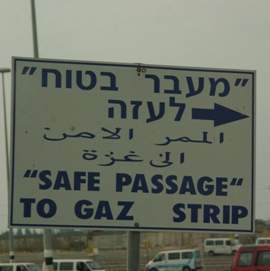

Jewish Fast For Gaza
A group of American Rabbis have launched a water-only fast, aimed at breaking the Jewish Community’s silence over Israel’s collective punishment of Palestinians. The initiative, called Jewish Fast For Gaza includes Reform, Reconstructionist, Orthodox and Conservative rabbis who call for lifting the blockade on Gaza. They plan to fast the third Thursday of each month, lasting from sunrise to sunset.
Rabbi Brian Walt:
- This idea of a fast in a time of trouble is an ancient tradition. We were stunned by the silence among the Rabbis.
- So we decided to gather together as a Minyan, to break the silence in our community.
- It’s not a Jewish-only initiative, it’s a Jewish initiated event to draw people of all faiths.
- The state that is the state of the Jewish people is preventing food from reaching children whose growth is stunted by these actions. To be silent in the face of that as a Rabbi, is inconceivable to me.
- Can’t one separate out, an opinion about a government and collective punishment of a whole people?
- Four goals: Lifting Israeli blockade, bring in food, make peace with your enemies.
- Does Israel recognize the Palestinian people?
- Why is Israel asking two things of it’s partner that its not prepared to do?
- It’s a pretext because Israel doesn’t want to negotiate. If Israel doesn’t want to negotiate, they’ll say the other side doesn’t want to, it’s a trick that Israel has done for decades.
- Anyone can join the fast, nearly 600 have joined. 70 Rabbis so far.
- The most vile and violent responses we get come from Israel.
- I grew up under apartheid in South Africa in a very Zionist family with deep connections in Israel.
Guest – Rabbi Brian Walt, co-coordinator of Jewish Fast For Gaza. Rabbi Walt is also the founding executive director of Rabbis for Human Rights-North America and Rabbi Emeritus of Congregation Mishkan Shalom, a synagogue in Philadelphia, PA. He is dedicated to the integration of spiritual life and social justice. Born in Cape Town, South Africa, he was active in the struggle against Apartheid. He is a member of the board of the National Religious Campaign against Torture.
———————————————
Afghanistan War, Civil Liberties, Criminalizing Dissent, Extraordinary Rendition, Guantanamo, Habeas Corpus, Human Rights, Iraq War, Military Tribunal, Targeting Muslims, Torture, Truth to Power
Podcast: Play in new window | Download
Host Updates:
Segments This Week:
—-



Cynthia McKinney and 20 Peace Activists Return From Israeli Prison
While hoping to deliver humanitarian supplies, a Free Gaza Delegation boat was stopped in International waters by the Israeli Navy earlier this month. Among the nearly 100 U.S. peace activists was former Congresswoman Cynthia McKinney and Irish peace activist and Nobel laureate Mairead Maguire. McKinney and others had been in custody since Tuesday of last week, but could have been released earlier if they signed a document admitting they violated Israel’s blockade. McKinney – “It’s quite unusual for anyone to get a glimpse inside an Israeli prison.”
Cynthia McKinney:
- There were 21 of us on the Free Gaza Boat, they were also bringing boats for Palestinian fisherman in Gaza.
- We embarked on our journey on the Spirit of Humanity boat. You can tell the folks put a lot of love in re-furbishing the boat, with the paint and making it a livable place for a 30 hour journey.
- That boat was destroyed by the Israeli military. They took some kind of huge magnetic item that held the boat suspended and shook it violently.
- It was an unusually calm day, it was absolutely beautiful. But it was 37 hours on the boat including the Israeli Navy intercept. It was nighttime, we were still in International waters and the Israelis threatened us.
- Remember I was on the Dignity when the Israelis rammed it.
- This time, they disabled the GPS, they tried to provide an escort to push us into Israeli waters.
- That tactic didn’t work. They also utilized, something I haven’t seen before, a “wave making machine,” because they shook us up and down.
- The GPS was turned off, communications were disrupted ( small EMP weapon?) I think they were trying to get us into Israeli waters, to make it look like we were off course.
- That did not happen, and they regrouped, and waited for us to enter Gaza territorial waters. That’s when these four speed boats came very quickly. Eight soldiers dressed like ninjas with the ski-mask, they commandeered the boat. Ejected the captain, and took over the steering.
- They put into one room on the boat, told us to sit down and shut up. We were forced to leave the boat with our hands in the air, some were handcuffed.
- The Israeli soldiers were rough with Maguier, she saw them take down one of the women, and she protested, and the soldiers roughed her up with bad language, it was a scene, and the men came to her rescue and those men got handcuffed.
- We got a full body search, we were held by the military for several hours, they transferred us to a detention facility, then to a full prison.Romley Prison. We were mixed in with the prison population. It was amazing, where we were there were young women of African and Asian descent.
- The Israelis actively blocked our effort to meet with our attorneys. We were deported from a country we didn’t intend to enter. The Free Gaza Movement has no intention of stopping.
Guest – former United States Representative and was the 2008 Green Party nominee for President of the United States. McKinney has served as a Democrat in the U.S. House of Representatives from 1993–2003 and 2005–2007, first representing Georgia’s 11th Congressional District and then Georgia’s 4th Congressional District. She is the first African-American woman to have represented Georgia in the House.
—–



Private Contractors in Afghanistan / Pakistan
Since President Obama announced the strategy for Afghanistan and Pakistan in late March of this year, news of troop deployment, drone attacks, and the killing of innocent Afghani and Pakistani civilians is heard nearly every week. Private contractors, mercenaries and the war profiteers in the region rarely make headlines however. One study has concluded that private contractors and mercenaries outnumber US soldiers. Check out – Outsourcing Intelligence in Iraq by Amnesty International and Pratap Chatterjee.
Pratap Chatterjee:
- President Obama has inherited long term contracts in Iraq and Afghanistan, 5-10 year contracts.
- If canceled (contracts) the system will shutdown. For every soldier in Iraq there is a contractor, for every soldier in Afghanistan, there are 2 contractors
- A lot of these people are cooks, janitors, builders, mostly from India, Pakistan, Sri Lanka, Phillipines, Egypt, Bosnia. They do the dull and dirty work nobody else wants to do.
- There’s no draft, so in a volunteer army, the US employs Indians/Bangladeshis for 300 dollars a month, cooking, cleaning. You have contract interrogator types who are making 250 thousand a year.
- There are now 15 thousand prisoners in each country, Iraq, Afghanistan.
- When US goes to interrogate these prisoners, they need translators.
- L3 which is based in New York City, bought up Titan. Titan. under L3 subcontracts interrogators.
- Titan is gone now (by name, same people involved) , but there’s a new company set up by Spider Marx, the guy in charge of intelligence during the invasion of Iraq. Global Linguist Solutions with Dyncorp.
- Contracts are designed to maximize profits. Company such as L3 is paid for 7000 translators, but penalized for having only 6000. 1000 unqualified translators are brought in to war zones.
- Interagency Roundtable Standards
Guest – Pratap Chatterjee, he’s recently returned from Afghanistan. Pratap is a journalist and former executive director of Corpwatch, an Oakland based corporate accountability organization.
—–
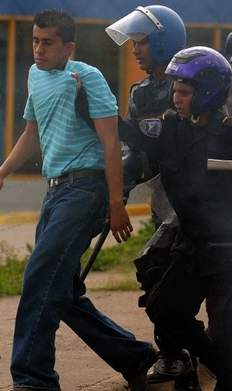
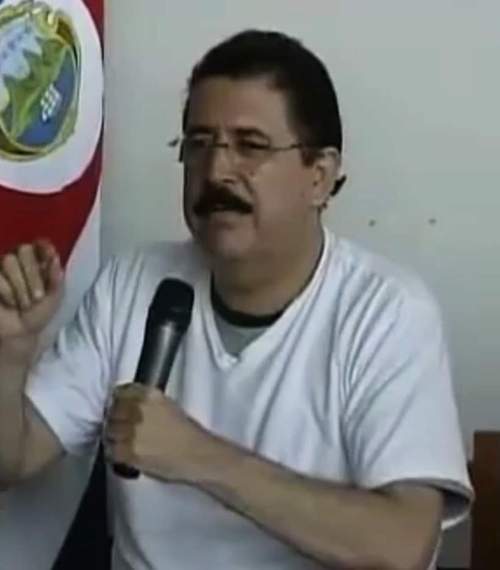
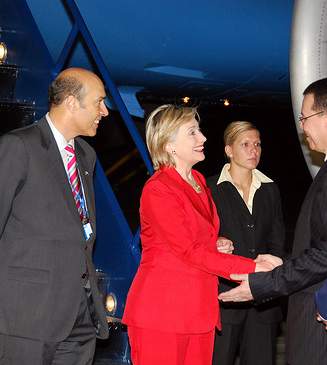
Honduran Coup Tries to Halt Advance of Latin American Left
Two weeks after the Honduran Coup ousted President Manuel Zelaya was prevented from returning to the country. Today we look deeper into the life of Manuel Zelaya, his background among the land_owning class, and his shift as a reform minded leader increasing wages for workers and teachers. Half way through his term Zelaya was inspired by changes in Venezuela, Bolivia and Cuba. He soon had the support of labor unions and social organizations that put him at odds with the corrupt social elite and drug mobsters. Today we talk with author Roger Burbach, about how Zelaya enraged the Honduran elite which led to up to the military coup.
Roger Burbach:
- The news in the main stream press about the coup was to stop Zelaya from re-election.
- Zelaya was not seeking re-election but a constituent assembly on the ballot to draft a new constitution for the country. Similar to Venezuela, Bolivia, and Ecuador.
- Either way, Zelaya could not run for re-election as the media and Honduran elites are portraying.
- The existing Honduran constitution was drafted in 1982, a very repressive constitution, back when John Negroponte was working with the death squads.
- US Sec of State, Hilliary Clinton doesn’t like Zelaya, she didn’t like him when she met him in early June.
- ALBA, an alternative free trade agreement that believes in solidarity measures and economic measures, led by Cuba, Venezuela, Ecuador and Bolivia.
- The US has the strongest military presence in Honduras, than any other Central American country. I would suggest that the US military intelligence knew about the impending coup and did nothing to stop it.
- Why does the US care about Honduras? Strategic military point in Central America, amid three radical governments now rising.
- New radical left leaders such as Chavez, Morales, Correia in Ecuador, Reformist governments of Brazil, Uraguay, maybe El Salvador. The US wants to drive a wedge in there, as with the coup Zelaya was aligned with the radical countries.
- The World Bank and the IMF have all suspended economic support except for the United States.
Guest – Roger Burbach, author of the Pinochet Affair and Director of the Center for the Study of the Americas based in Berkeley, California. Read more articles from Roger Burbach.
—————————————————————————–
Afghanistan War, Civil Liberties, Guantanamo, Habeas Corpus, Human Rights, Iraq War, Supreme Court, Surveillance, Targeting Muslims, Torture, Truth to Power
Podcast: Play in new window | Download
Host Updates:
Segments this week:
——-
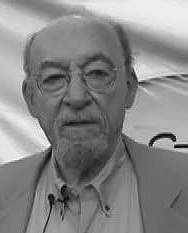


Peter Weiss : International Human Rights Law and the Royal Dutch Shell Settlement
Europe’s largest oil company Royal Dutch Shell settled a landmark lawsuit last week, agreeing to pay 15.5 million to avoid a trial over it’s alleged involvement in human rights violations in the Niger Delta. The case was brought by relatives of human rights and environmental activists killed in Nigeria who accused Shell of complicity in the 1995 executions of Nigerian writer and environmentalist Ken Saro Wiwa and eight others. Charges in the case include summary execution, crimes against humanity, torture, inhumane treatment, arbitrary arrest, wrongful death, assault and battery, and infliction of emotional distress. Attorney Peter Weiss explains how historic laws such as the Alien Tort Claim are used to hold multinational corporations accountable for human rights crimes.
Peter Weiss:
- They (Royal Dutch Shell) knew all along that they were complicit. Decades ago I was involved in the struggle against colonialism in Africa. What that settlement represented was a victory against neo-colonialism.
- I think we all hope at the Center for Constitutional Rights that this will send a signal to other companies.
- Peter Weiss and Rhonda Copeland were instrumental in beginning the first cases in which human rights violations, taking place in other countries could actually be litigated in the United States.
- Alien Tort Statute Claim: We first discovered that during the Mei Li massacre. It’s a one sentence law that goes back to the first judiciary act in the United States in 1789.
- It simply says, an alien shall have a right of action in district court for a violation of the law of nations. (as international law was called in the 18th century)
- Ten years later Amnesty International got in touch with CCR, saying we have this torturer in Paraguay. Which became known as Filartica – 1978 / 1980 was the decision. It set the stage for hundreds of cases.
- About 15 years ago, CCR applied that statute to the human rights crimes of corporations in foreign countries.
- We’ve had a few victories and one of them was the UNOCAL case, where UNOCAL was using slave labor. That case was settled. Now, the Wiwa case was settled.
- If you’re familiar with what corporations are doing around the world, you can imagine how many such cases can be brought.
- Royal Dutch Shell was actually paying these Nigerian soldiers that were committing these atrocities.
- The worst thing that they did was go to the Nigerian government and say we have to get rid of these trouble makers.
- Nigeria was under a corrupt dictatorship at the time.
- We’re not the only ones, the Center for Justice and Accountability out in California have victories against Salvadorian torturers
- Jerry Nadler had a hearing on the state’s secrets act and on the opening statement, he says people bring these suits and the government comes in and says state secrets, the suit can’t go forward. But there’s an international law says Nadler, that has to be a remedy for every right.
Guest – Peter Weiss, former Vice President, Center for Constitutional Rights and Vice President, of the International Association of Lawyers Against Nuclear Arms.
—–
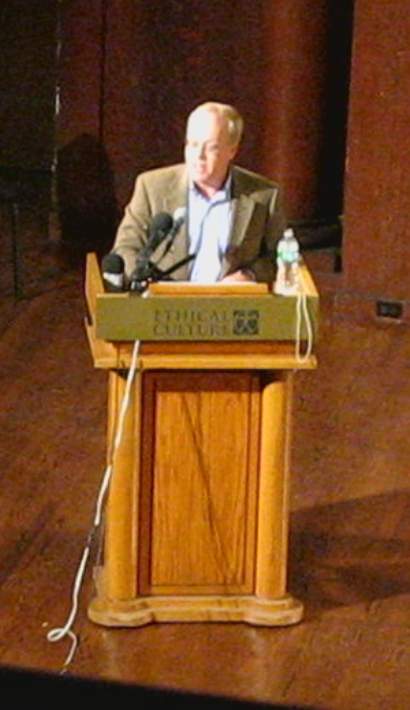
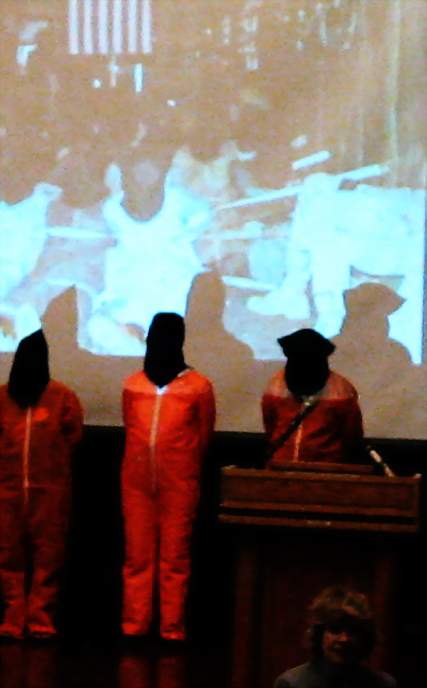

A Revolution Books Town Hall Meeting: TORTURE AND THE NEED FOR JUSTICE
We hear from Laura Flanders, journalist and host of GRITtv, and Chris Hedges, former New York Times Mideast bureau chief, author of many books specializing in American and Middle Eastern politics and society. He spent nearly two decades as a foreign correspondent in Central America, the Middle East, Africa and the Balkans. He was also the Middle East bureau chief for The New York Times. Chris Hedges’ new book, “Empire of Illusion: The End of Literacy and the Triumph of Spectacle,” will be out in July and can be preordered at your local bookstore.
Speakers :
Organized by Revolution Books / Libros Revolucion
—–
For WBAI Listeners
Men, Mobs and Law by Rebecca Hill
Men Mobs and Law is the title of Rebecca Hill’s new book that explores the complexities of protest movements, race, class and gender. Hill draws comparisons in two types of left protest campaigns, those that defend labor organizers from prosecution and the anti-lynching groups that seek to memorialize lynching victims. Hill says, both groups have influenced each other throughout history and she specifically connects the narratives and stories of the NAACP’s anti lynching work to the IWW’s labor defense campaigns.
Rebecca Hill’s treatment of these dramatic stories has been called “fresh, lively, richly detailed, and impassioned.”
Rebecca Hill:
- When I first started the book it was about martyrdom and the American Left and heroic politics. I’ll take these particular cases, John Brown, Haymarket etc.
- In the research I found that this other problem that there is no law enforcement and the source of terror that black activists were dealing with was extra-legal. . . . and their anti-lynching activism that started in the 60s – and I then went back to Ida B Wells, Dubois – 1887-1890s
- Ida B Wells talking about how dangerous passion is. This is a problem in leftest activism in general. It goes to the big questions of political theory and rationale, the role of emotions, questions of what is the meaning of popular action,
- I didn’t want to condemn either side, the anti lynching movement strategy or and the socialist left defense organizing, because they both came out of experiences that informed their politics.
- If you’re facing terroristic mobs, you’re going to respond with a strategy. The anarchists and socialists movement response spoke to the lynching and their response was in inadequate – “rise up in self defense.”
- If you lived in the post reconstructive South, rising up in self defense was not realistic without legal protection.
- What came out of the Haymarket movement in the 1880s was the idea that the key element of solidarity in a labor movement is when somebody is arrested, or victimized as a result of organizing, its the membership that can save them. Not the law. The law is a tool, it’s not enough perhaps.
- The courts are structured by the ruling class, they’re stacked against the worker who is in court. They didn’t want the court room take away from the radicalism of the movement.
- Elizabeth Gurley Flynn – defense expert in IWW trials and Sacco Vanzetti case. Anarchists connected to Sacho and Vanzetti case didn’t want structure and organizing
- I was very active in the Mumia Abu Jamal campaign, you see the greater successes in the popular defense organizing it’s not based on the legal strategy, its when is the movement stronger. You see more victories in the thirties because the labor movement was big and the consensus was moving to the left during the New Deal
- John Brown’s defense is close to the fugitive slave rescues which were anti-court . John Brown’s notion that the courts are wrong and should answer to a higher power, not the current law of slavery. John Brown attempted to make available weapons for slaves to take up arms. See the book John Brown Mysteries
- I don’t really think of John Brown as a religious zealot, I think he really believed in popular organizing and popular activism.
Guest – Rebecca Hill, author of Men Mobs and Law.





















